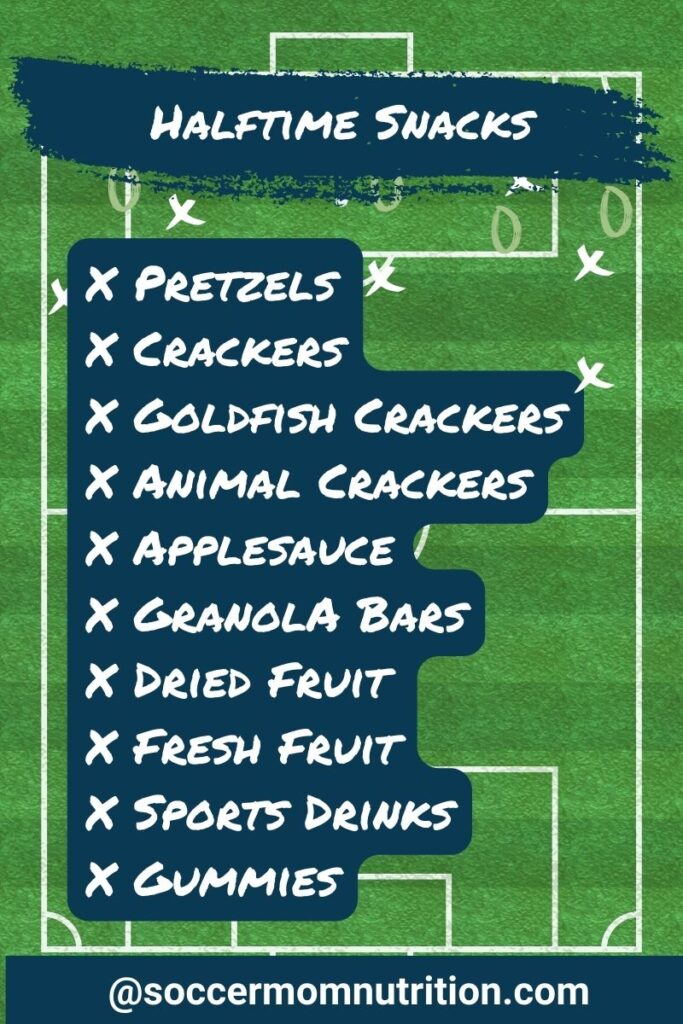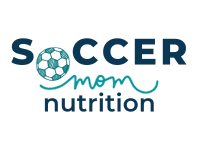Halftime Snacks Every Athlete Needs to Refuel
Do you need tips to power up your athlete for the second half of the soccer game? Look no further! As both a registered dietitian and a soccer mom, I’ve crafted the ultimate halftime snack lineup to keep your footballer kicking until the final whistle blows.
These halftime soccer snacks help them maintain peak performance and focus throughout the full 90.
Packed with easily digestible carbs and hydrating fluids, they’re conveniently portable and perfectly suited to replenish soccer player’s energy reserves.
But it’s not just what to eat – I’ll also steer you clear of halftime pitfalls, ensuring they stay fueled without feeling weighed down, bloated or sluggish in the second half.
Whether they’re on a club team, a weekend warrior, or cheering from the sidelines, elevate their game with these halftime snack strategies.
Halftime snack ideas to refuel energy
At halftime, athletes should eat a snack that has about 30-60 grams of easy to digest carbohydrates. This is enough enough carbohydrate to keep their blood sugar (glucose) steady but not cause stomach upset.
But, I’ve seen athletes who can eat much more than this, and some who prefer a sports drink instead of eat food.
My kids prefer to pack some of these foods in their gear bags so they have what they need on the sidelines.
I make sure they have a few options because sometimes they want a sweet snack and sometimes only savory and salty snack will do.
So my list has both!
Halftime snack foods-dietitian and athlete faves
My list of halftime snacks has simple and easy to digest, high carbs that will get you refueled for the second half.
- Pretzels
- Graham crackers
- Goldfish crackers
- Animal crackers
- Granola bars
- Fig bar
- Dried fruit-craisins, raisins, mango
- Fresh fruit-oranges, bananas, grapes, watermelon
- Applesauce
- Sports drinks
- Fruit snacks
- Sport chews
- Half a peanut butter and honey sandwich

Since eating or drinking high carbohydrate snacks and sports drinks has been shown to improve performance in the second half of a game, plan to have snacks ready for halftime. (1)
Because every athlete is different, you’ll want to try different foods to see what works best for them. And it’s best to try new foods on practice or rest days, not during a game, in case they cause any GI issues.

Goals for halftime snacks
The goals for halftime snacks are:
- Rehydrate with fluids
- Replace electrolytes
- Refuel energy with carbohydrates
Since some sports, like soccer, don’t have stoppage time to refuel and rehydrate during competition, eating halftime snacks refuels, rehydrates, and replaces electrolytes lost through sweat when soccer players need it most.
Eating easy to digest carbs, salty snacks and rehydrating with a sports drink can also help replace electrolytes and encourage thirst, helping athletes to drink even more.

Why are halftime snacks important
Halftime snacks are important because as athletes play, their body’s fuel starts to run out causing them to feel sluggish, unfocused and hungry.
Eating snacks and drinking sports drinks with carbohydrates at the half time boosts energy stores for the later stages of games. Staying hydrated also helps to sharpen concentration.
Sports drinks for carbohydrate and fluids
When athletes find it too hard to eat food during a game or intense practice I recommend soccer players drink a sports drink containing sodium and glucose (sugar).
Studies show that the combination of sodium and glucose (sugar) increase absorption and the desire to drink. (2)
Sports drinks that have 6-8% carbohydrate concentration and sodium and other electrolytes have been shown to be effective at both replacing carbohydrates and rehydrating to avoid dehydration. (3)

Drink about 20-40 oz of a sports drink each hour. If possible, keep water bottle near the sideline so athletes can take a few gulps every 10-15 minutes or when stoppage time allows.
What to avoid for halftime snacks
Avoid halftime snacks that cause stomachaches. Eating too much food or foods high in fiber, fructose and fat won’t digest quickly enough and will slosh around in stomach during the second half.
1. Too much carbohydrate and high fructose
Since carbohydrates are digested at the rate of about 60 g/hr, more carbohydrates are not better. In fact, eating too much can delay digestion and cause GI symptoms. (4)
Additionally, fructose (a sugar found in some fruits) slows digestion and can cause an upset stomach. So athletes should avoid foods high in fructose for halftime snacks.
Some fruits have higher fructose levels, so athletes may want to test how their body responds to these types of foods during a practice but never try a new food during a game.
2. High fiber foods
Eating foods high in fiber can slow digestion and cause cramping, bloating and stomach discomfort. Snacks low in fiber are best.
Fiber is essential for athletes and you can make sure to meet their daily fiber needs outside of your competitions and games.
3. High fat foods
Foods high in fat can also cause stomach upset since they digest slower and linger in stomachs.
Bottom line-make a plan for halftime
Snacks at halftime are a key part of their game day performance sports nutrition plan. Find the best foods and sports drinks that work best for them. Athletes should choose easily digestible snacks that are low in fiber, fat and protein.
And don’t forget that fueling on game day takes more than one meal.
Check our our posts on pre game snacks, pre game meals and what to eat before a game so that they are ready to perform at your best.
Join our mailing list and get our FREE Pre-Activity Fueling Guide.
Stephanie Magill, MS, RD, CD, FAND has over 22 years of experience in public health and nutrition. As a performance registered dietitian nutritionist, Stephanie specializes in sports nutrition and provides simple and actionable information so that athletes can be well fueled for high performance on and off the field. Stephanie has a Master’s Degree in Nutrition and is a Fellow of the Academy of Nutrition and Dietetics.

